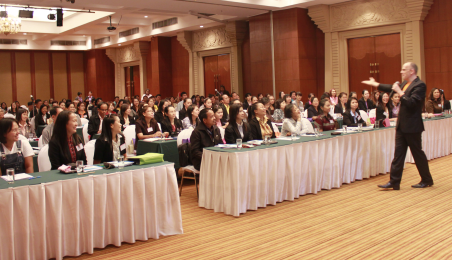
Yep, that’s me in a suit!
After seeing my May schedule lots of teachers have written in asking:
What on Earth do you have for breakfast? And where do you get all your energy from?
The easy answer is “It all comes from the students!” 🙂
(Which is certainly true in that with a great group you can’t help but feel totally energised when doing a Genki English lesson, and similarly when I have to teach a room of corpses it just drains me completely!)
In reality though there is a secret Ninja trick behind it all.
Ninja Trick: The 80/20 Rule
Whilst all the videos on the site might look like the teacher is “on” the whole time, if you have a look carefully at the lesson plans they are all designed so that the amount of time that the teacher is “on” is actually really small, mainly just during the warm up.
The rest of the time it is the kids who are doing all the work.
This is how you manage to save all that energy, whilst still giving an amazing lesson.
i.e. in the learning of the words and the song, the computer does all the work, and the class games all involve the kids being in groups or pairs so the teacher’s job is to quietly wander round, checking they are following the rules and making notes on what pronunciation etc. needs more work.
I’m a big fan of the Pareto Principle which allows you to get 80% of the results from just 20% of the effort.
Or …..
Of course you could do it all yourself, use no computer and be “on” the WHOLE lesson.
But I think you’d end up like one of those corpses pretty soon!
Remember,
Don’t work hard. Work smart!
Genki English is all about getting the very best results for the kids, whilst still giving you more energy for the other important things in your life such as friends and family. So use the lesson plans and really pay attention the next time you see me in a workshop. 🙂
I want you, and the kids of course, to walk out of class like you can fly through the air, be full of life and have the energy to take on any task in your way – that’s what being Genki is all about!
So try out the ideas above and do let me know what you think in the comments!
Be genki,
Richard
P.S. One extra “Ninja Trick” is in the technique of “you are the average of the 5 people you spend the most time with.” e.g. Your weight, your salary, your teaching skills, your foreign language level will all be the average of the 5 (adult) people you spend the most time with (try the math and see! 🙂 . And this goes doubly so for your energy levels. If you spend your time around lethargic people, you will become like that. But if your friends are all positive, get up and go people you will become like that too. It’s not really a trick as such, it’s just that you pick up their ways of thinking, and it is your way of thinking that determines your energy, your income, your weight etc. So if you want to be more energetic outside class, try and spend more time with people who seem to be energetic all the time. It’s amazing what a difference it will make. And of course a great way to do that is to join a live Genki English workshop! 🙂




wow!
I really like this one:
”you are the average of the 5 people you spend the most time with.”
it’s obviously true!
very very interesting
Very nice.
Like Margit, love that quote as well.
Your energy is deeply contagious Richard, even through your posts.
I like your tips on energy saving in the classroom… thanks.
ps, grammatically though surely “From where…”?
I do agree, Richard that we shouldn’t teach students all the time, it is boring for them. Using smart board, team work and only 20 percents of techer’s instructions makes the lesson alive. We use in our school inquiry based learning which gives students an opportunity to research information and present it in groups and it helps students to be active learners and teacher plays the role of the mentor more.